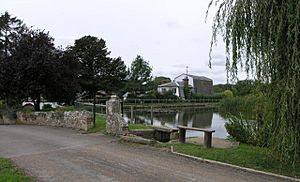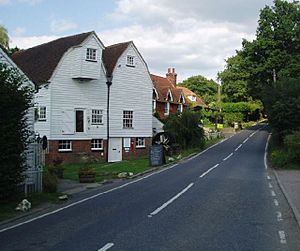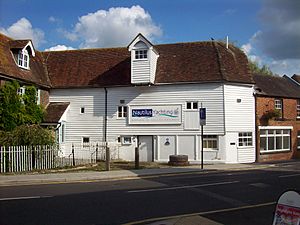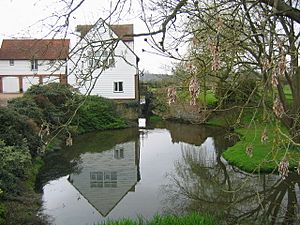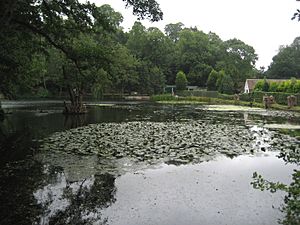River Eden, Kent facts for kids
Quick facts for kids Eden |
|
|---|---|
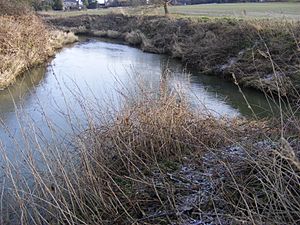
The mouth of the River Eden, where it joins the River Medway in Penshurst, Kent
|
|
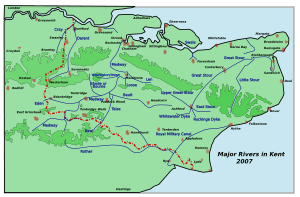
Rivers in Kent
|
|
| Other name(s) | Broadmead Water (section) |
| Country | England |
| Region | Kent |
| Physical characteristics | |
| Main source | Titsey, Surrey 51°16′37″N 0°02′12″E / 51.27694°N 0.03667°E |
| River mouth | confluence with River Medway Penshurst, Kent 51°10′12″N 0°11′04″E / 51.17000°N 0.18444°E |
| Basin features | |
| Tributaries |
|
The River Eden is a river in south east England. It flows into the River Medway. The Eden starts in Surrey, near Titsey. It then flows south through Oxted before turning east into Kent. The river passes through Edenbridge and by Hever Castle. Finally, it joins the Medway at Penshurst.
The name 'Eden' comes from the town of Edenbridge. In old English, Edenbridge was called Eadhelmsbrigge, meaning 'Eadhelm's Bridge'.
Contents
River Eden's Journey
The River Eden begins in Titsey parish, Surrey. Its source is about 350 metres north of the Clacket Lane motorway services. At first, it flows southwest through Oxted. Then it turns south. The first part of the Eden, before it meets the Gibbs Brook, is also known as the Broadmead Water.
After passing Haxted Mill, the Eden meets its main branch, the Eden Brook. It then turns east and enters Kent near Edenbridge. The river continues flowing east, filling the beautiful lake at Hever Castle. It then turns southeast to meet the Medway at Penshurst. Most of the land around the Eden is made of a type of clay called Weald Clay.
River Health: Water Quality
The water quality in the River Eden is mostly okay, but some parts are not as good. The areas near Oxted are rated lower. The river gets treated water from two sewage treatment plants in Edenbridge and Oxted. These areas are checked closely to make sure the water is clean enough.
The river and its smaller streams are home to many types of fish. The amount of water flowing in the river changes with the seasons. It's highest in January and lowest in July. Water is also pumped from the river near Penshurst to fill Bough Beech Reservoir, which provides drinking water.
Here's how the River Eden's water quality was in 2019:
| Section | Ecological Status |
Chemical Status |
Overall Status |
Length | Catchment | Channel |
|---|---|---|---|---|---|---|
| Upper Eden | Poor | Fail | Poor | 6.873 km (4.271 mi) | 22.808 km2 (8.806 sq mi) | |
| Middle Eden | Moderate | Fail | Moderate | 8.611 km (5.351 mi) | 15.143 km2 (5.847 sq mi) | Heavily modified |
| Lower Eden | Moderate | Fail | Moderate | 26.99 km (16.77 mi) | 79.807 km2 (30.814 sq mi) | Heavily modified |
Historic Watermills
For hundreds of years, the River Eden and its smaller streams powered many watermills. These mills used the force of the flowing water to turn large wheels. These wheels then powered machinery to grind grain into flour, or for other tasks like fulling cloth (making it thicker) or even making gunpowder.
Mills on the River Eden
- Titsey Mill: This was a very old mill. A Roman building here was changed into a fulling mill.
- Limpsfield Mill: This mill existed even before the Norman Conquest of England in 1066.
- Tidy Green Mill, Limpsfield: This mill was mentioned in the Domesday Book, a famous survey from 1086. It was taken down in 1892.
- Upper Mill, Oxted: This mill was removed in the late 1700s.
- Middle Mill, Oxted: The building for this corn mill still stands today, but it's now offices. It was rebuilt in the 1890s. It used a water turbine to create power.
- Coltsford Mill, Oxted:
This mill was also mentioned in the Domesday Book. It still has its original machinery from around 1860. The waterwheel still turns! Today, it's a place for events, and there's a trout fishing spot nearby.
- Haxted Mill, Edenbridge:
Haxted Watermill is a very old mill, also mentioned in the Domesday Book. It stopped grinding flour in 1919. It was a museum for a while and is now a restaurant. Its large waterwheel was installed around 1830.
- Town (Honour's) Mill, Edenbridge:
This mill had a water-powered pump in 1291 to drain marshland. The current building is from the early 1800s. It used to grind grain but stopped before World War I.
- Hever Castle Mill: There was a corn mill at Hever Castle.
- Chiddingstone (Cranstead) Mill:
This mill might also be a Domesday site. It stopped working in the 1930s. The building was empty for many years but has now been turned into a house.
- Vexour Park Mill: A weir (a small dam) in Vexour Park shows where a mill once stood.
Smaller Streams and Their Mills
The River Eden has several smaller streams that flow into it. These are called tributaries. Some of these tributaries also had their own watermills.
Gibbs Brook Mills
The Gibbs Brook once powered four watermills.
- Ivy Mill, Godstone: This mill was partly rebuilt in 1698. It burned down in the 1920s.
- Leigh Mill, Godstone:
This Domesday mill was used to make gunpowder in the 1500s. It was very important for making gunpowder in England. Today, the building has been turned into a house.
Eden Brook Mills
The Eden Brook powered three watermills.
- Hedgecourt Mill, Felbridge: This was an old hammer mill, used for working metal. It was first mentioned in 1562. It was a very busy mill for centuries, changing hands many times. The mill building was turned into homes in the 1960s.
- Felcourt (Wire) Mill, Felbridge: This mill was also a hammer mill, used for metalwork, from 1567 to 1786. It was later changed into a corn mill in the early 1800s. It had two large waterwheels. The building is now a pub.
Other Mills on Tributaries
- Lingfield Tannery: This place, near Lingfield Racecourse, used water power to process leather. The old tannery building was taken down in 1996 and houses were built there.
- Doghurst Mill: This mill was on the Crooked River, another small stream. By 1868, it was no longer working.
- Clarkes Mill, Lingfield: This was a hammer mill, used for metalwork, in 1574.
- Ware (Weir) Mill, Felbridge: A mill has been on this site since 1241.
- Four Elms Mill, Hever: This mill might be the one mentioned in 1279, where a boy was tragically caught in the mill's gears. It was taken down by 1933.
- Bough Beech Furnaces, Hever: This was an old site for metalworking, with two furnaces.
- Christmas Mill, Edenbridge: This mill had two waterwheels in 1347. The mill building still exists and is now a home.
- Salman's Farm Mill, Penshurst: This was a Domesday corn mill. Its machinery was removed in the 1930s.
|
 | Calvin Brent |
 | Walter T. Bailey |
 | Martha Cassell Thompson |
 | Alberta Jeannette Cassell |


